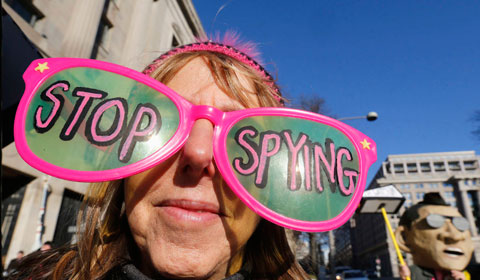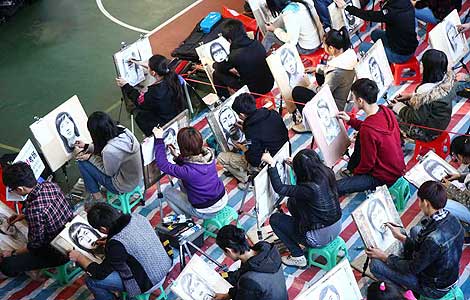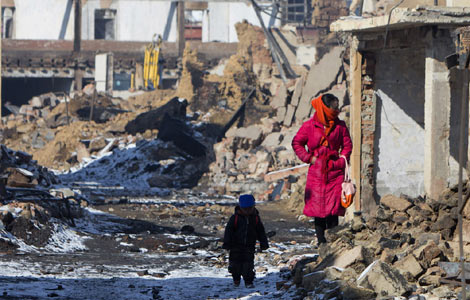Elders dogged by medical woes
Updated: 2014-01-18 07:54
By Bai Ping (China Daily)
|
|||||||||
My family life plunged into chaos a month ago when my father suddenly collapsed and went into a coma on the day he and my mother came to visit us in Beijing.
He was diagnosed as having suffered a cerebral hemorrhage and was placed under intensive care in two top hospitals. After undergoing sophisticated medical procedures that included sending a platinum coil through a blood vessel to pack and seal off a leaking artery in the brain, he finally woke up last week to his anxious, weeping family, and the somber reality of ailing retirees' healthcare woes.
My parents, both in their 70s, belong to the millions of senior citizens who visit their children in cities with warmer climate or public central heating systems during the Spring Festival holidays. They usually stay with us for several months until the chilly, damp weather retreated from their town on the Yangtze River.
But this year, instead of celebrating the time for togetherness, hope and renewal, we had to race against it to save my father, navigating the dark corners of an elderly healthcare system that is plagued by inadequate facilities and doctors, tight budget, inefficiency and a culture of guanxi or personal connections.
The battle started with the struggle to get a hospital bed, a difficult proposition because patients from across the country flock to the hospitals in the capital every day in search of the best possible medical care. It is particularly hard on elderly patients, because hospitals fear those with serious, chronic problems would use them as a nursing home.
As a result, guanxi is alive and kicking in hospitals. Often, getting a bed in a top hospital and an appointment with a good doctor becomes favors that are expected to be returned in the future.
Paying hospital bills can also be daunting for migrant retirees under a national health insurance scheme managed by local authorities. Hospitals demand non-locals pay out of their own pocket, and get reimbursed by their insurance provider in their hometowns later. This practice heightens the anxiety of migrant patients and their families because benefits of medical insurance coverage vary from region to region, depending on the local financial situation and policies.
My father's advanced medical treatment and post-operation recovery have depleted our family savings and forced us to raise money in ways we could not have imagined earlier. I have confessed to some colleagues that I dread to take calls from unfamiliar numbers after my father's hospitalization, because they could be from doctors who might have bad news to convey. Most likely the calls are from the cashier's office to clear new bills.
Occasionally, doctors tell us some prescriptions, such as drip fluids that nourish my father's brain, cannot be claimed later. All the time we have paid the bills without questioning. It is a power relationship where patients (and their relatives) have no choice but to trust doctors' professional knowledge and ethics.
I wonder what more the government could do to help elderly patients who cannot get a bed in time or pay large amounts of cash up front. Fatal incidents have prompted the government to publicly shame the hospitals that have turned away emergency patients for lack of free beds. Health experts estimate about half of the elderly patients do not visit hospitals because they fear that paying the medical bills would be beyond their means.
My father has not spoken much since he regained consciousness. On the occasions that he does, he mutters words about hospitals and his medical insurance, the biggest challenge to migrant retirees seeking a happier and more meaningful existence.
The writer is editor-at-large of China Daily.
Email: dr.baiping@gmail.com
(China Daily 01/18/2014 page5)

 Obama bans spying on leaders of US allies
Obama bans spying on leaders of US allies
 Wildfire out of control in Los Angeles, US
Wildfire out of control in Los Angeles, US
 Bull-taming festival kicks off in India
Bull-taming festival kicks off in India
 Way to art school
Way to art school
 'American Hustle,' 'Gravity' lead Oscar nominations
'American Hustle,' 'Gravity' lead Oscar nominations
 138th Westminster Kennel Club Dog Show to open
138th Westminster Kennel Club Dog Show to open
 Volcano displaces thousands in Indonesia
Volcano displaces thousands in Indonesia
 China issues fog alerts
China issues fog alerts
Most Viewed
Editor's Picks

|

|

|

|

|

|
Today's Top News
Looming baby boom no sweat: officials
Obama bans spying on leaders of US allies
US Treasury chief says high-level engagement 'welcomed'
Dirty air? Why not wash it?
Li delivers economic reform vow
He Xiaohui: A visionary rooted inservice
Auto-glass maker invests $200 million for US plant
City to attract more foreign experts
US Weekly

|

|







